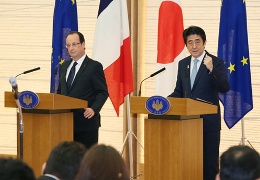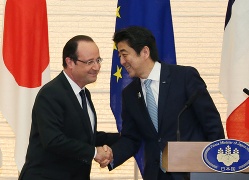Countries & Regions
State Visit to Japan by French President François Hollande
 (Photo: Cabinet Public Relations Office)
(Photo: Cabinet Public Relations Office)
 (Photo: Cabinet Public Relations Office)
(Photo: Cabinet Public Relations Office)
-
Itinerary Outline
(1) H.E. Mr. François Hollande, President of the French Republic, accompanied by Ms. Valérie Trierweiler, paid a state visit to Japan from June 6 to June 8.
(2) They made a state call on Their Majesties Emperor Akihito and Empress Michiko on the morning of June 7, and attended a State Banquet hosted by Their Majesties the Emperor and Empress in the evening.
(3) Between 11:20 A.M. and 2:15 P.M. on June 7, Shinzo Abe, Prime Minister of Japan, and President Hollande held a summit meeting, a joint press conference and a working luncheon. Wrapping up their talks, the two leaders announced a "Japan-France Joint Statement" on bilateral cooperation in the three areas of politics and security, the economy and culture, along with a "Road Map" for putting the content of the Statement into action over the coming five years and a "Joint Declaration on Culture." In addition, the Governments, related organizations and businesses of the two countries drew up and exchanged six documents on cooperation in areas that include the economy, nuclear energy and tourism.
(4) President Hollande delivered a speech in the Chamber of the House of Councillors on the afternoon of June 7.
(5) On the morning of June 8, President Hollande and Ms. Valérie Trierweiler received a call by Their Majesties the Emperor and Empress at the State Guest House, Akasaka Palace, to bid farewell.
(6) During their stay, President Hollande and Ms. Valérie Trierweiler also attended an exchange event on science and technology, visited the Nezu Museum and held a meeting with Japanese and French students.
-
Outline of Summit Meeting
1. Initial Remarks
Prime Minister Abe put forward the following three proposals as guidelines for the broad direction of cooperation between Japan and France. President Hollande gave explicit consent to them, while expressing hopes to send a joint message at the upcoming Group of Eight (G8) summit that the two countries will promote a strategy of economic growth.
(1) Aiming to achieve a world based on such values as "law" and "freedom," instead of "force" and "coercion."
(2) Making use of the high technological competence of Japan and France to contribute to powerful growth of the world economy.
(3) Promoting exchanges between their peoples in a way that strengthens each other's cultural transmitting capacity.
2. Political and Security Fields
(1) Fight against Terrorism/Africa
Prime Minister Abe proposed strengthening cooperation in information gathering in Africa and other areas, based on the lessons learned from the terrorist incident in Algeria in January this year. President Hollande explained about France's fight against terrorism in Mali, and the two leaders agreed to reinforce cooperation on counter-terrorism measures.
Based on the results of the fifth Tokyo International Conference on African Development (TICAD V), the two leaders agreed to work together on African development, such as promoting rice cultivation on the continent, in order to eradicate poverty, which is seen as one of the root causes of terrorism.(2) Cooperation in the Pacific
Recognizing that France has the world's second-largest Exclusive Economic Zone (EEZ) and two-thirds of the EEZ is in the Pacific, Prime Minister Abe described Japan and France as "friends in the Pacific" and said Japan hopes to explore the possibility of cooperation with France with focus on humanitarian assistance and national disaster reduction in the Asia-Pacific region. President Hollande agreed, saying that France hopes to work with Japan in order to foster a greater sense of unity in the region.
3. Bilateral Relations
Prime Minister Abe and President Hollande reached agreements on the following three issues.
(1) In the areas of politics and security, Japan and France will (a) hold a meeting of foreign and defense ministers; (b) promote cooperation regarding defense equipment; (c) set up a consultation forum on export controls, in order to "achieve a world based on common values."
(2) In the economic field, the two countries will promote an economic growth strategy and move forward cooperation between Japanese and French businesses in such areas as aerospace and nuclear energy, following in the footsteps of the successful bid by a consortium of Mitsubishi Heavy Industries Ltd. and Areva SA to win a nuclear power plant construction project in Turkey.
(3) Japan and France, culinary giants of the East and West, will diffuse each other's cuisine cultures to the world.
4. International and Regional Situations
(1) The two leaders agreed to continue stressing that possession of nuclear weapons by North Korea will never be tolerated. Prime Minister Abe asked for France's continued understanding and cooperation regarding the issue of Japanese citizens abducted by North Korea. President Hollande pledged France's full cooperation.
(2) President Hollande expressed France's support for Japan's aim of becoming a permanent member of the United Nations Security Council. The two leaders agreed to maintain dialogue in order to achieve Security Council reforms.
Speech to Parliament
In a speech in the Chamber of the House of Councillors on June 7, President Hollande said Japan and France share common histories of democracy and expressed his determination to develop France's relationship with Japan into an "exceptional partnership." He underscored the following points.
France hopes that tensions in the Asia-Pacific region will be lessened through compliance of international law by relevant parties.
France supports Japan's aim of becoming a permanent member of the United Nations Security Council.
Resolute measures should be taken on the North Korean nuclear and missile issues. France backs Japan's efforts to resolve the issue of abductions of Japanese citizens.
France would like to promote cooperation with Japan on natural disaster reduction in the Pacific and African development, in particular in boosting food production.
Japan and France will hopefully revitalize bilateral trade and investment, and push forward policies for economic growth on a global scale.
Evaluation
By successfully hosting the first state visit by a French President in 17 years, Japan built a strong cooperative relationship with the administration of President Hollande, which has placed great value on relations with Japan since its inauguration in May 2012.
The summit meeting and the three documents adopted by the two leaders (including the "Japan-France Joint Statement") gave shape to the deepening of "an exceptional partnership" based on common values, interests and responsibilities. It is important to maintain the momentum and steadily put the content of the documents into action.
President Hollande's speech to the Diet communicated the unity of Japan and France based on common values.
The visit to Japan by President Hollande received extensive news coverage by Japanese and French media, providing added momentum to the building of stronger relations between the peoples of both countries.

